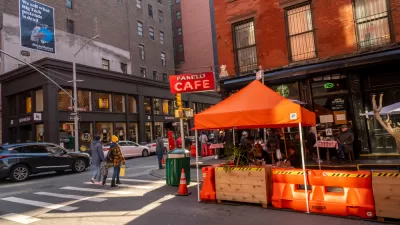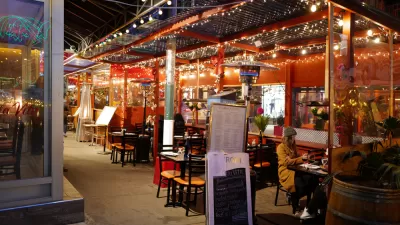The city's new regulations pave the way for making the pandemic experiment a permanent fixture.

As Lori Weisberg reports, the San Diego City Council approved new regulations that will make permanent the city's outdoor dining program, started during the pandemic to support struggling restaurants as COVID-19 forced businesses to adjust to social distancing guidelines. The program "will allow restaurant owners to extend their outdoor seating onto sidewalks, and in metered and unmetered parking spaces in front of their venues as long as they pay a fee, a requirement that up until now has not been imposed."
The new program, called Spaces as Places, will start next July and "include a number of design and safety regulations that will permit restaurants to install platforms for seating along unpainted, yellow or green curbs as long as they are at least 20 feet away from an intersection, street corner, alley or driveway." The new regulations only permit outdoor dining on streets with a maximum speed limit of 30 miles per hour.
Repurposing curb space and parking lots for outdoor dining has become a hallmark of the COVID-19 pandemic as restaurants looked for creative ways to continue serving customers. Cities all over the U.S. scrambled to implement outdoor dining regulations and permitting. Now, as the pandemic and temporary outdoor dining programs wind down, city leaders must decide on the future of 'al fresco streets.'
FULL STORY: Like dining in the street? San Diego decides to make pandemic experiment permanent for restaurants

Planetizen Federal Action Tracker
A weekly monitor of how Trump’s orders and actions are impacting planners and planning in America.

Maui's Vacation Rental Debate Turns Ugly
Verbal attacks, misinformation campaigns and fistfights plague a high-stakes debate to convert thousands of vacation rentals into long-term housing.

Restaurant Patios Were a Pandemic Win — Why Were They so Hard to Keep?
Social distancing requirements and changes in travel patterns prompted cities to pilot new uses for street and sidewalk space. Then it got complicated.

In California Battle of Housing vs. Environment, Housing Just Won
A new state law significantly limits the power of CEQA, an environmental review law that served as a powerful tool for blocking new development.

Boulder Eliminates Parking Minimums Citywide
Officials estimate the cost of building a single underground parking space at up to $100,000.

Orange County, Florida Adopts Largest US “Sprawl Repair” Code
The ‘Orange Code’ seeks to rectify decades of sprawl-inducing, car-oriented development.
Urban Design for Planners 1: Software Tools
This six-course series explores essential urban design concepts using open source software and equips planners with the tools they need to participate fully in the urban design process.
Planning for Universal Design
Learn the tools for implementing Universal Design in planning regulations.
Heyer Gruel & Associates PA
JM Goldson LLC
Custer County Colorado
City of Camden Redevelopment Agency
City of Astoria
Transportation Research & Education Center (TREC) at Portland State University
Jefferson Parish Government
Camden Redevelopment Agency
City of Claremont





























